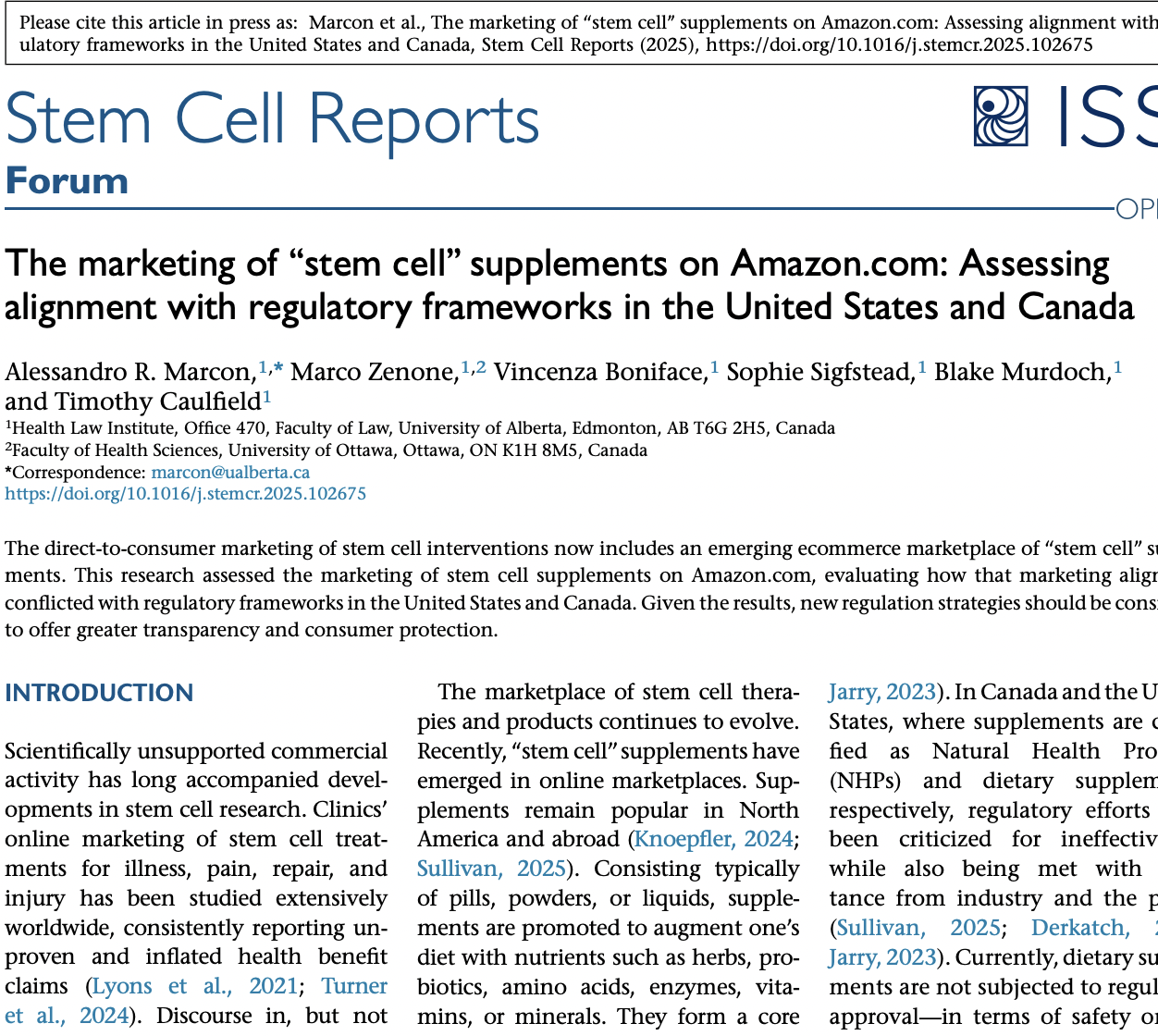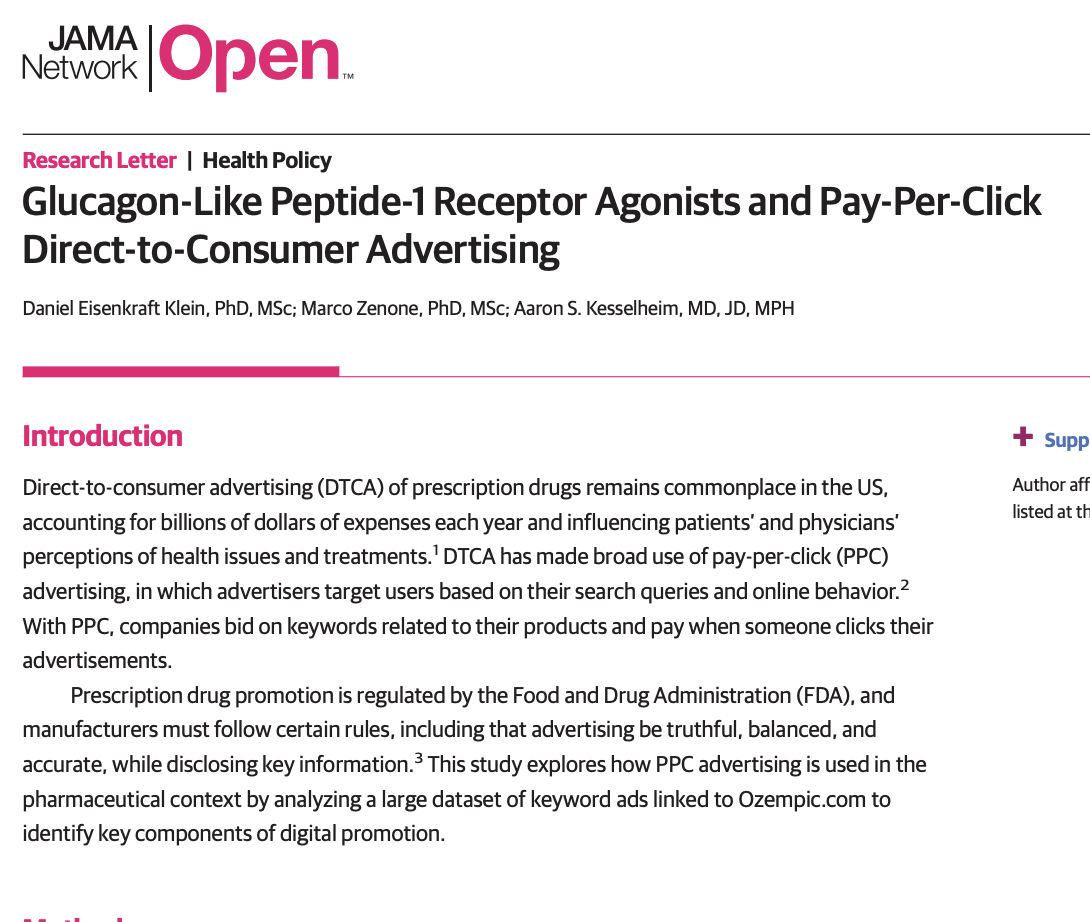Research Theme 1. Public Health and Medical Dis-and-Misinformation
My work examines medical misinformation and disinformation in Canada, focusing on how it spreads, the harms it causes, and the systems that enable it. A major focus is cancer misinformation, where patients encounter false cures, alternative therapies, and unproven treatments widely promoted online. The harms are multi-layered: patients can delay or abandon effective treatment, experience financial distress from paying for costly but ineffective interventions, and endure the emotional toll of false hope. Families often become deeply invested in these claims, making the consequences both medical and social. Digital platforms play a central role, amplifying misleading content through algorithms that prioritize engagement and visibility. In this way, misinformation is not only a matter of misleading claims but also of structural amplification driven by commercial incentives.
Beyond cancer, my research also explores disinformation about public health more broadly. Narratives that downplay the severity of specific diseases (e.g., COVID-19), advocate for scientifically unsupported positions (e.g., vaccines causing autism), or suggest that individual behaviour alone determines health outcomes can create confusion and undermine collective protections. Similarly, messaging that encourages private health solutions or misrepresents what causes disease often shifts responsibility away from systemic and commercial determinants of health, placing undue blame on individuals. These narratives can directly influence policy debates, public attitudes, and health behaviours in ways that increase vulnerability to harm. At its core, medical and public health disinformation exploits moments of uncertainty, fear, and need, turning them into opportunities for profit. Understanding these harms and their structural roots is critical for protecting trust in evidence-based medicine and strengthening public health systems.
Research Theme 2. The Commercial Determinants of Health and Platform Governance
The second theme of my research focuses on the commercial determinants of health and the governance of digital platforms. Here, I examine how profit-driven systems structure the online health environment, from the business models of social media companies to the advertising incentives that drive content visibility. Platforms are not neutral spaces. They are designed to maximize engagement, often amplifying sensational, misleading, or emotionally charged content, including health misinformation. This amplification is not accidental but central to how platforms generate profit.
My work considers the implications of this system for public health. When harmful health content, whether misinformation about vaccines, unproven cancer treatments, or misleading wellness claims, gains traction because it keeps users engaged, it highlights the systemic forces that shape what people see and trust. Beyond misinformation, platform structures also provide opportunities for industries that market harmful products such as alcohol, tobacco, or unhealthy food to reach wide audiences under the guise of lifestyle and wellness. In these cases, commercial priorities directly conflict with public health goals.
This research underscores the need to shift the focus away from blaming individuals for being misled and toward holding accountable the systems that create and sustain harmful health environments. Governance mechanisms, regulatory approaches, and platform accountability are therefore central to addressing these challenges. At stake is not only the accuracy of health information online but the broader question of how digital spaces can either undermine or support public health. By analyzing the commercial determinants of health and platform governance, my work seeks to highlight pathways for building healthier digital ecosystems that prioritize evidence-based information, equity, and accountability over engagement-driven profit.
Research Theme 3. The Portrayal of Health and Wellness Topics in Online and Public Spaces
The last strand of my research investigates how different health topics are portrayed in online and public spaces, with attention to how these portrayals shape public perceptions of health and illness. Social media platforms have become central sites where people learn about wellness, prevention, and treatment, and the narratives encountered there strongly influence what people come to believe about health. While these spaces can expand access to information and community support, they also circulate misleading or harmful portrayals that blur the boundaries between evidence, opinion, and marketing.
My work examines how influencers, lifestyle brands, and digital marketers frame health issues in ways that make them compelling and persuasive. This includes the promotion of unproven supplements and diets, the reframing of alcohol and other harmful products as lifestyle enhancers, and the blending of scientific-sounding language with aspirational wellness messaging. These portrayals can normalize risky behaviours, reinforce unrealistic standards of health, and shift responsibility away from systemic and structural determinants of health toward individual choices.
By analyzing how a wide range of health topics are represented online, this research demonstrates that portrayals are never neutral. They affect how people perceive the seriousness of conditions, the legitimacy of treatments, and the value of public health interventions. Understanding these dynamics is essential for building healthier online environments and for countering the ways in which commercial interests and cultural narratives shape public perceptions of health.
List of Publications
43. Chow K, Zenone M, Kenworthy N, Merid B, Maani N. Generating opposition to universal health care policies in the United States: An analysis of private health industry advertising on Meta platforms. PLOS Glob Public Health. 2025;5(7): e0003244.
42. Harries B, Zenone M, Hartwell G. Feeling lonely in the online crowd: what TikTok tells us about young people and loneliness, Health Promotion International. 2025;40(4): daaf094.
41. Zenone M, Harries B, Hartwell G. The promotion of oral nicotine pouches for non-smoking cessation purposes on TikTok. Nicotine and Tobacco Research. 2025;ntaf024.
40. Zenone M, Marcon A, Kenworthy N, van Schalkwyk M, Caulfield T, Hartwell G, Maani N. Google allows advertisers to target the sensitive informational queries of cancer patients. HKS Misinformation Review. 2024;5(7).
39. Turuba R, Zenone M, Srivastava R, et al. Do you have depression? A summative content analysis of mental health-related content on TikTok. DIGITAL HEALTH. 2025;11.
38. Zenone M, Kenworthy N. Should WHO Partner with TikTok to Combat Misinformation? The Lancet. 2024;404(10467):2046-2047.
37. Zenone M, van Schalkwyk M, Hartwell G, Caulfield T, Maani N. Selling Misleading “Cancer Cure” Books on Amazon: Systematic Search on Amazon.com and Thematic Analysis. JMIR. 2024;26:e56354.
36. Hartwell G, Gill M, Zenone M, McKee M. Smartphones, social media, and teenage mental health. BMJ. 2024;385:E079828.
35. Zenone M, Snyder J, van Schalkwyk M, Bélisle-Pipon JC, Hartwell G, Caulfield T, Maani N. Alternative cancer clinics’ use of Google listings and reviews to mislead potential patients. BJC Reports. 2024;2(1):55.
34. Snyder J, Zenone M, Grewal A, Caulfield T. Crowdfunding for Complementary and Alternative Cancer Treatment in Tijuana, Mexico: Content Analysis. JMIR Cancer. 2024;10:e52018.
33. Turuba R, Cormier W, Zimmerman R, Ow N, Zenone M, Quintana Y, Jenkins E, Ben-David S, Raimundo A, Marcon A, Mathias S, Henerson J, Barbic S. Exploring how youth use TikTok for mental health information in British Columbia: Semi structured interview study with youth. JMIR Infodemiology. 2024;4(1):e53233.
32. Guegan E, Zenone M, Mialon M, Gallopel-Morvan K. Portrayals of popular alcohol influencer’s videos on TikTok. BMC Public Health. 2024;24(1):1384.
31. Marcon A, Zenone M, Caulfield T. The Portrayal of Organ Donation on TikTok: A Content Analysis of Popular English-Language TikTok Videos. Digital Health. 2023;9.
30. Snyder J, Zenone M. Vaccine Related Crowdfunding on a ‘Freedom Fundraising’ Platform. PLOS One. 2023;18(7):e0288539.
29. Zenone M, Snyder J, Belisle-Pipon JC, Caulfield T, van Schalkwyk M, Maani N. Advertising Alternative Cancer Treatments and Approaches on Meta Social Media Platforms: Content Analysis. JMIR Infodemiology. 2023;3(1):e43548.
28. Chasca W, Nerada S, Zenone M, Barbic S. TikTok and #OccupationalTherapy: Cross-Sectional Study. JMIR Formative Research. 2023;7(1):e45554.
27. Bagenal J, Zenone M, Barbic S, Maani N. Embracing the Non-Traditional: Alcohol Advertising on TikTok. BMJ Global Health. 2023;8(1):e009954.
26. Zenone M, Caulfield T. Using Data From a Short Video Social Media Platform to Identify Emergent Monkeypox Conspiracy Theories. JAMA Network Open. 2022;5(10): e2236993.
25. Zenone M, Kenworthy N, Maani N. The Social Media Industry as a Commercial Determinant of Health. International Journal of Health Policy and Management. 2022. doi: 10.34172/ijhpm. 2022.6840.
24. Zenone M, Caulfield T. Newspaper Coverage of COVID-19 Vaccination Requirement for Organ Transplant. JAMA Network Open. 2022;5(12): e2248800.
23. Van Schalkwyk M, Zenone M, Maani N, Petticrew M, McKee M. Back to our Roots or Sowing New Seeds: Thinking Anew on the Paradigms of Health, Harm and Disease. Journal of Public Health. 2022;44(1):i28-i33.
22. Barbic S, Brooks E, Lassak N, Khaleghi M, Zenone M, Ow N, Leon A, Matthias S. “It Cannot be Boring!”: Developing a Measure of Function for Young Adults Accessing Integrated Youth Services. Journal of Patient-Reported Outcomes. 2022;6(1):92.
21. Zenone M, Snyder J, Marcon A, Caulfield T. Analyzing Natural Herd Immunity Media Discourse in the United Kingdom and the United States. PLOS Global Public Health. 2022;2(1):e000078.
20. Zenone M, Raimundo A, Nanji S, Neha U, Karen T, et al. Implementing Integrated-Youth Services Virtually in British Columbia during the COVID-19 Pandemic. Integrated Healthcare Journal. 2022;4:e000089.
19. Zenone M, Ow N, Barbic S. TikTok and Public Health: A Proposed Research Agenda. BMJ Global Health. 2021;6:e007648.
18. Zenone M, Kenworthy N. Pre-Emption Strategies to Block Taxes on Sugar-Sweetened Beverages: A Framing Analysis of Facebook Advertising in Support of Washington State Initiative-1634. Global Public Health. 2021;17(9):1854-1867.
17. Zenone M, Kenworthy N, Barbic S. The Paradoxical Relationship Between Health Promotion and the Social Media Industry. Health Promotion Practice. 2021;21(5):684-686.
16. Zenone M, Hawkins B. Powerful Allies and Weak Consensus: Towards a Deeper Understanding of how Health-Harming Industries Seek to Influence Global Health Governance. International Journal of Health Policy and Management. 2021.
15. Lee K, Freudenberg N, Zenone M, Smith J, Mialon M, Marten R, Lima J, Friel S, Eisenkraft D, Crosbie E, Buse K. Measuring the commercial determinants of health and disease: A proposed framework. International Journal of Health Services. 2021;52(1):115-128.
14. Freudenberg N, Lee K, Buse K, Collin J, Crosbie E, Friel S, Eisenkraft D, Lima J, Marten R, Mialon M, Zenone M. Defining Priorities for Research and Action on the Commercial Determinants of Health: A Conceptual Review. The American Journal of Public Health. 2021;111(12):2202-2211.
13. Zenone M, Snyder J, Crooks V. Selling Cannabidiol Products in Canada: A Framing Analysis of Advertising Claims by Online Retailers. BMC Public Health. 2021;21:1285.
12. Pattison R. Puyat J, Giesbrecht A, Zenone M, Mathias S, Barbic S. Examining Mental Health Differences Between Transgender, Gender Nonconforming, and Cisgender Young People in British Columbia. Frontiers in Psychiatry. 2021:1660.
11. Zenone M, Silva D, Smith J, Lee K. How Does the British Soft Drinks Association Respond to Media Reporting of Research Against Their Interests? Globalization and Health. 2021;17:72.
10. Zenone M, Snyder J, Crooks V. What are the Informational Pathways that Shape People’s Use of Cannabidiol for Medical Purpose? Journal of Cannabis Research. 2021;3:13.
9. Snyder J, Zenone M, Caulfield T. Crowdfunding Campaigns and COVID-19 Misinformation. American Journal of Public Health. 2021;111(4):739-742.
8. Abdullahi I, Chana NK, Zenone M, Ardiles P. Art During Tough Times: Reflections from an Arts-Based Health Promotion Initiative during the COVID-19 Pandemic. Global Health Promotion. 2021;28(2):78-82.
7. Zenone M, Cianfrone M, Sharma R, Majid S, Rakhra J, Cruz K, Costales S, Sekhon S, Mathias S, Tugwell A, Barbic S. Supporting youth 12–24 during the COVID-19 pandemic: how Foundry is mobilizing to provide information, resources and hope across the province of British Columbia. Global Health Promotion. 2021;28(1):51-59.
6. Snyder J, Zenone M, Caulfield T. Crowdfunding for Complementary and Alternative Medicine: What are Cancer Patients Seeking? PLoS One. 2020;15(11):e0242048.
5. Zenone M, Snyder J, Caulfield T. Crowdfunding Cannabidiol (CBD): Hype and Misinformation on GoFundMe. American Journal of Public Health. 2020;110(S3):S294-S299.
4. Snyder J, Zenone M, Crooks V, Schuurman N. What Medical Crowdfunding Campaigns Can Tell Us About Local Health System Gaps and Deficiencies: Exploratory Analysis of British Columbia, Canada. Journal of Medical Internet Research. 2020;22(5):e16982.
3. Zenone M, Irving P, Cianfrone M, Lockhart L, Costales S, Cruz K, Ignacio J. Increasing Awareness of a Provincial Mental Health Resource for Boys and Young Men 12 to 17 Years: Reflections from Foundry’s Province-Wide Campaign. Health Promotion Practice. 2020;21(5):684-686.
2. Zenone M, Snyder J. Crowdfunding Abortion: An Exploratory Thematic Analysis of Fundraising for a Stigmatized Medical Procedure. BMC Women’s Health. 2020;20:1-7.
1. Zenone M, Snyder J. Fraud in Medical Crowdfunding: A Typology of Publicized Cases and Policy Recommendations. Policy & Internet. 2019;11(2):215-234.






































